Good morning-
Have you already gone to your follow up visit to the vet? If not- I would ask them to look at it. Meantime, so long as it is not warm or sore to the touch or bothering her, I would just keep a close watch. If her behavior changes (lethargic, loss of appetite) I would call the vet ASAP. I’m assuming you’ll have a few kitten check ups in the near future, so your vet can also help you monitor it. Seromas can take a very long time to resolve. Best of luck!!
Good afternoon!
I volunteer at a local rescue in their feline only facility. We received a young cat, named Cami, recently that is 9 months old. She has a right head tilt that started about 2 months ago (7 months of age) according to the person who had her since she was a kitten.
A local vet attempted an exam but did not have a scope small enough to look into her ear and the exam became very uncomfortable for Cami. The plan was to get a smaller scope, knock her out and do the exam. Unfortunately, they are unable to acquire the scope at this time. The suspicious is that this is a polyp.
Any ideas what this could be? We are currently wondering if this could be something treatable with medication (to try first) or should we pursue the polyp investigation. Since we are a rescue we are trying to balance the cost but still address Cami’s needs.
Cami shows no distress because of her condition. She does not scratch the ear or shake her head. And is awfully cute!
Thank you, in advance, for any help you can offer!
Comments
Hi I have read your article about seromas and how to best leave them alone. Now my kitten has one after her desexing surgery however hers keeps getting bigger. At what size does it become concerning?
It doesn’t look infected and she is behaving just fine.
Thank you!
Comments
I rescued a kitten several weeks ago. He was said to be a female and to be 4 /5 weeks old. Took him to vet next day and she turned out to be a boy around 3 weeks old. Was very sick and had fleas really bad. He is healthy now but very aggressive. I have an 8 year old cat who has never been with any other cats. The kitten attacks him to the point he cries and I can’t get him to stop attacking my adult cat. Please help
Comments
My 16-1/2 year old calico has been on prednolisone since August. Even though she was still eating normally she went from about 9 pounds to 7.2 pounds in a year. Tests showed everything was good with the exception of inflamed intestines. Being on the prednolisone has helped her gain weight again, she now weighs about 8.4 pounds. Within the past month on occasion she has started howling very loudly for no apparent reason. She doesn’t seem to be in any pain, sometimes it actually seems as though she’s confused. Any ideas on what could be causing her howls? What can I do to help her? Dr Graff has been her vet since she was a tiny kitten, I would bring Pumpkin in if necessary but hate the idea of stressing her out in doing so. Thanks for any suggestions.
Comments
I just had my 5 month old kitten spayed on Friday Dec 13, 2019. On Sunday there was a good amount of bruising. Today is Thursday and day 6 of recovery and there is a bump a little smaller than a ping pong ball that is under the stitch line. Does this look like it is just a fluid sac or do you think a hernia? She runs, jumps, is and has been very active, eats, pee, poop, everything else is normal. I push on it and no reaction from her, there is no fever to it either.
First picture is the bump on day 6. Second picture is her stitches on day 6 of healing. Third picture is what her belly looked like on Day 2 and 3 after spay.
Comments
Hello, I have a 2.5 year old desexed female cat and a 4-month-old male kitten. We moved house 4 months ago, and adopted the new kitten about 3 months ago. In our previous house, we used to let the older cat out during the day to roam the neighborhood, although she never went too far.
Since we’ve moved, we only let her out once or twice a week as there are a lot of cats here and she gets into more fights and has gotten injured once. She seems very stressed out, wanting to go out constantly.
We have tried everything to ease her stress: playing with her a lot, brushing and cuddling her daily, giving her a mix of wet and dry good food (that she likes), putting up Feliway diffuser around the house, and she plays with the kitten daily.
However, she still exhibits signs of stress, ie hiding, minor crouching, hissing or growling from time to time to us or the kitten, sleeps more, meows more, generally less affectionate towards us.
Do we have to let her go outside daily like before, so she can be less stressed, or is there any other way to lessen her stress? It has been 4 months and I am worried it will become chronic stress for her.
Comments
I work front desk at a vet and a client brought in a stray. No chip and shelters wouldn’t take her. She was going to be released outside since no one would home her and it’s so cold in VA.. so I took her in. I got her shots and tested for FIV, FeLuk, etc to know if she’s safe around my 10 yr neutered male cat. Then the vet said she seems to be pregnant but the ultrasound was inconclusive. But she definitely matches the description of “pinking” and has no hair around her nipples. But I have no idea how far along she is! Last week we didn’t see kittens on ultrasound but now they think she looks pregnant for sure. How do I know? Vet doesn’t want to stress her with more imaging. Also, what do I do when she goes into labor?? Will my male cat be okay around her? They’ve been ok the few times I’ve let them interact but will she change personality when she has kittens? Is she’s likely nicer now than she’ll be after just since she’s “nesting”? Is the stress too much to introduce her to my cat? She’s scratching through the door to get to the rest of the house so I’d like not to keep her cooped up 24/7. Also, when do I know labor is starting? Will she pick a place? How can I make that not be the bed or couch? Or can I cover them? And she eats like she’s STARVING! She looks so tiny to be pregnant.. I read you feed them all they want at a certain point; when is that? How much should I give her each stage? I have Hills ultimate care adult. I went ahead and got some Iams kitten food but when do I start mixing it in? I’m even more lost not knowing how far along she is. I’ve had her 1 week so at least that far along but I could use as much help as possible. Especially regarding labor. I know she’ll most likely do it all on her own but I see so much of what can go wrong working at a vet and I’d like to be prepared. I’ve attached pictures of her. Please help me help her.






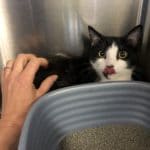

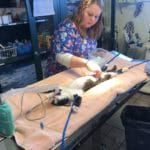
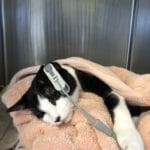

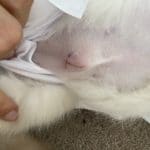
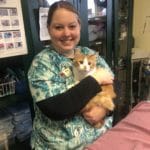
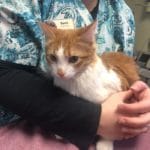
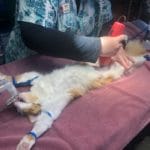
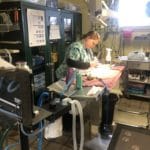
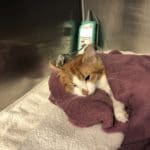
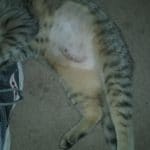
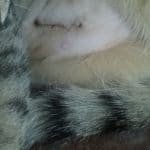
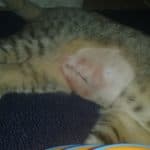

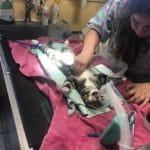
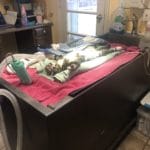


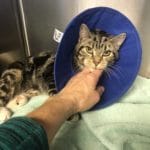





Hello!
In cases like these I really prefer to get a good exam before jumping on other treatment options. After I am sure there is nothing abnormal in the ear we talk about other possible causes of head tilt. I think it might be best to sedate and examine for ear issues and even a polyp in the oropharynx area. Start here. Try not to do otics until you get an exam done. I hope this helps. Let me know what happens.
Thank you! I appreciate your advice – I’ve seen your videos on polyps and you’ve seen a friend’s cat for nasal polyps. Will let you know what we find out.